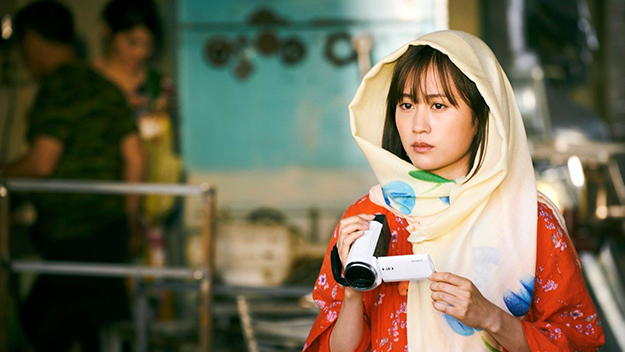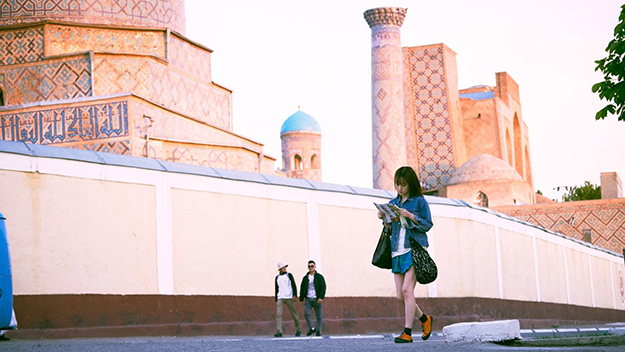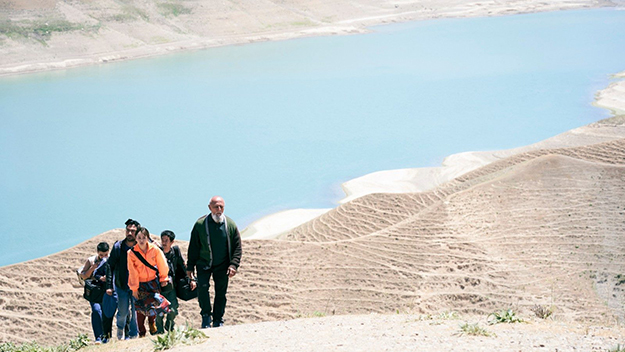Close Reading: To the Ends of the Earth
The Critics Academy, a program of Film at Lincoln Center and a venture of Film Comment, is a workshop for aspiring film writers, providing a valuable platform to launch their careers. Throughout the 57th New York Film Festival, Film Comment will be publishing work from young critics taking part in the program.

Images from To the Ends of the Earth (Kiyoshi Kurosawa, 2019)
During the age of Atsuko, which lasted seven years, AKB48 dominated the Japanese pop landscape like no group before or after. Clad in a short plaid skirt, Atsuko Maeda, the ace of the largest idol act in the world, would scrunch her eyes, smile, and place a hand on her hip, and hundreds of thousands of male votes would pour in every summer to rank her first in the AKB48 elections, which also meant sales of hundreds of thousands of CDs. Girls—prettier, peppier, better singers—tried to displace her, but to no avail; on an island where earthquakes are as frequent and unavoidable as headaches, she alone was called the Unshakable.
Until she quit. She removed herself from the national spotlight, announcing that she was going to focus on her lifelong dream: acting. She started working with Kiyoshi Kurosawa with Seventh Code, and in Before We Vanish. She married, had a baby. Then, she starred in Kurosawa’s To the Ends of the Earth.
In the film, Atsuko is Yoko, a quiet announcer from a variety show, reporting from Uzbekistan. The movie follows her being ferried from one shooting location to another, from Tashkent to Samarkand, by three grumbly Japanese men. If you’re more familiar with Kurosawa’s sci-fi thrillers, like Creepy or Foreboding, the film is a surprising change in pace. The director of the variety show marauds around the towns and lakes of Uzbekistan, looking for what he thinks the audience wants—exotic, energetic plot-oriented footage—and Kurosawa is interested in the direct opposite. The film is a meditation and an excavation, not of foreign lands, but of the fantasies that we map on to them.
Kurosawa is interested in the tides of Yoko’s expressions: how she looks at the innards of a bazaar, how she stares at a goat. How she acts as she goes on camera, what she looks at when she’s not. When the camera is on, Yoko is full of pep and curiosity, bubbling with nods and smiles. When it’s off, she looks down, sullen, her smile wiped, and she walks away, her aura a dull monochrome. She prefers to eat, and travel around, alone. Around the midpoint of the film, we find out that Yoko has a boyfriend—a fireman—who she wants to marry back in Japan, and that she has dreams of becoming a singer. We see her open up, just a little: she tells the cameraman of their crew that she has an audition for a musical back home. “How I do,” she says, firmly, “will determine the rest of my life.” In the final scene, she bursts into song alone on a mountaintop. Ah, we think: this is the story of a girl who finds her voice in a distant land.

That would be a pleasant, but one-note, reading. I’d have to be unaware that Atsuko Maeda is a former pop idol, and bracket off the fact that Atsuko’s face has a history—one that is so ingrained in the Japanese popular imagination that when, in the first minute of the film, she started running, my brain immediately retrieved at least four music videos that depict Maeda running. As she ran yet again—she runs many times in this film—I could hear my friends and my father wondering, as we watched her on some teen drama on TV, why on earth she runs the way she does, which is a bowlegged scamper, like a newborn giraffe skittering away from a very slow lion. She ran the way she did as an idol.
This in itself isn’t notable—actors do run similarly over various films, after all. What’s more uncanny is that Yoko’s personality mapped perfectly onto what the public perceived Atsuko Maeda’s to be. A little sullen, reluctant, ungrateful, even withholding: there were many judgments and labels decreed online for what she was, which was an introvert who had passed an audition at the age of 14 that would determine the rest of her life. If the other girls in AKB48 were known for their galumphing energy, their sweat and tears in giving their all to please their fans, watching Atsuko made you feel like she wasn’t quite doing that, that she was holding something back. Like her character Yoko, she’d stop smiling when the camera stopped rolling. Atsuko evolved to mask even this reluctance, as the head heavy with the crown. But before she had an island of worshippers, she was a 15-year-old girl, sobbing and begging producer Yasushi Akimoto, Japan’s Max Martin, not to force her to be the girl at the center, to be the one that stands out. He’d told her to wipe her face, the lore goes, and step up—or else.
As Yoko sighs, sallow after a peppy reporting session, we are reminded of the pop starlet who hated the spotlight even as it suited her cheeks. Atsuko couldn’t completely mask that she had an on-and-off switch. This is a performance, the switch said, and it costs. I liked her for it. It was a suggestion of interiority, a commitment to an inner life. As Yoko, Atsuko revealed that she could flip her off-switch self into a performance, too, that she could dance on the tightrope of her former resentment.

Atsuko’s style in the film was initially surprising, because I hadn’t seen this texture in any of her acting, perhaps because her roles didn’t allow her to show it. In Kurosawa’s Seventh Code (2013), their first film together, Atsuko is an undercover assassin, pouting in a biker jacket and combat boots. She makes a clunky plot worse with heavy-handed acting, and she’s unable to deliver her lines without wood or flourish. She’s tooth-drill painful to listen to, which was basically keeping with the impression that I’d gotten from most of her teen flicks.
As Yoko, however, Atsuko has layers: one by referencing herself, of course, but another, crucially, of irony. As Yoko navigates through hundreds of people in a bazaar, we ask the questions she’d embodied helming a group of two hundred girl idols: what makes someone stand out in a crowd? In another scene, her director tells her to ride a brain-bending amusement park ride three times, to get a few minutes of entertaining material for his show. After enduring dozens of sickening high-velocity spins into the air, Yoko totters out, vomits, and is barely given a minute to recover herself before she’s told to be in front of a camera again. It only takes a blink to draw a parallel—a ride that hurls her around like a yoyo is a rather apt metaphor for the arc of Atsuko’s former singing career—as Yoko girds herself and states, “I can do it,” even though she’s still doubled over and clutching her stomach with exhaustion. The latter half of the film depicts Yoko running away from assorted imagined terrors, a tourist frightened by the shadows of an unfamiliar land. We see Yoko run, we see Atsuko run, and thus we see, in her body, a complicated image of the modern Japanese girl: running, ever-determined, toward something—as Atsuko, in her music videos—but also running away from something, as Yoko.
For most of her life, Atsuko was the object of fantasy for stadiums packed with men, and in the film, she is given room to be the girl who fantasizes, who dreams of performing in a way that allows her to feel. How deeply ironic, then, that Yoko’s fantasy is to sing. She daydreams in Tashkent’s Navoi Theater, imagining herself on stage belting Edith Piaf’s “L’Hymne à l’Amour”; she sings the same song, her arms wide open, alone on the steppes. For her, singing is a form of truth, eons away from the pep that she offers as a perky reporter for variety television. That Atsuko had been the most recognizable purveyor of pep for a generation, singing the summer anthems and cotton candy pop of AKB48, complicates the straight catharsis that might be read from Yoko singing. Instead of the rah-rah uplift of a girl finally taking a step to achieving her dreams of becoming a singer, Atsuko gives the idea nuance: what will be sacrificed for even this fantasy, she asks, and who will be dictating the terms? She flickers between Yoko and Atsuko, and we see the pop god who had resigned from divinity now give us the reason for her resignation: to show the price that she had paid, toggling between the performance she gave to the world, and the performance of living. The film ends on a close-up of her singing face, and we see the duality of Atsuko: is she an actor singing, or a singer acting? In this ambiguity, we hear the song of herself.
Moeko Fujii is a writer from Chiba and New York.







